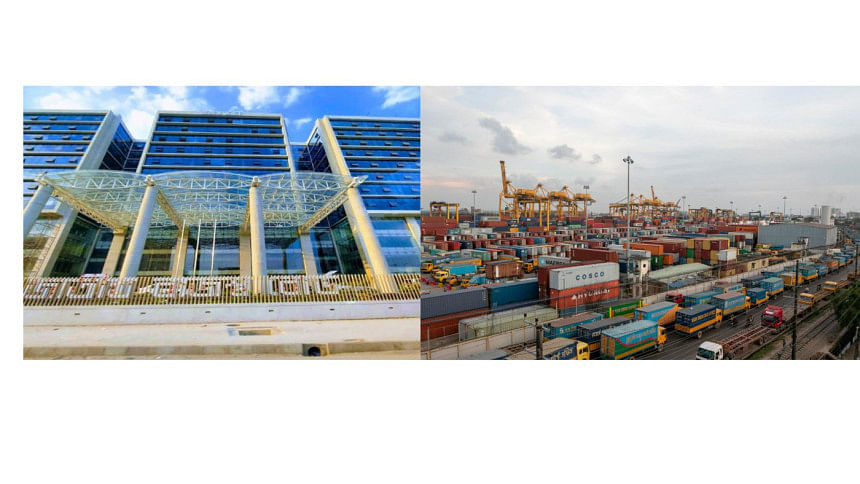Businesses suffer as NBR officials continue pen-down strike

The country's import and export operations have been severely disrupted for the fourth consecutive day today as officials of the National Board of Revenue (NBR) continued their pen-down strike in protest against the recently issued ordinance abolishing the NBR.
Business leaders and economists have warned that if the situation continues, it could lead to a shortage of essential commodities in the local market and a breakdown in the industrial production cycle due to delays in releasing imported raw materials.
According to NBR sources, officials from 25 customs stations—including Chattogram and Mongla ports and the Kamalapur Inland Container Depot (ICD)—as well as over 100 VAT, customs, and tax offices across the country have been observing a daily six-hour work abstention since May 14, from 9am to 3pm each day.
While export consignments are still being processed, importers say they are unable to clear their goods due to the ongoing disruption, which in turn is affecting exports that depend on imported raw materials.
Shawkat Osman, owner of Silver Steel Company, said his imported consignment of eight containers that arrived at Chattogram Port on May 14 is still stuck.
"Customs officials usually work from 9am to 8pm, but now they are leaving by 5pm," he said.
"With only two hours of active processing time between 3pm and 5pm, I could not complete the physical inspection of my goods. Without that, I can't complete customs clearance or pay the duties to release them."
He also noted that container demurrage and port charges are adding up to around Tk 1.5 lakh per day due to the delay.
Several clearing and forwarding agents echoed similar concerns, stating that while exports are technically exempt from the strike, the slowdown is affecting outbound shipments as well.
The inability to clear imported raw materials is already having a knock-on effect on export orders.
Deputy Commissioner of Chattogram Custom House, Mohammad Saidul Islam, said directives have been issued to ensure no file remains pending after the abstention hours.
"Even after 5pm, officials have been instructed to finish their pending files before leaving the office," he said.
He also claimed that export operations and airport services have remained functional during the protest, and his office has not received any official complaints regarding the issue.
However, with 78 percent of the country's imports and 84 percent of the country's exports passing through Chattogram Port, any disruption in import clearance has a ripple effect across the entire economy, business leaders warned.
According to data from Chattogram Custom House, the average number of import consignment assessments and inspections per day has dropped by half over the past four days—from around 4,000 to approximately 2,000.
Without assessment and inspection, importers are unable to release their goods.
According to customs data, on May 13, some 3,460 import bills of entry were processed, whereas the number fell to 1,874 the next day – the first day of the strike.
The number stood at 1,897 on May 15 and 1,895 on May 17.
Today, customs activities remained suspended until 3pm due to the ongoing strike, officials said.
As a result, container congestion has increased by 1,000 TEUs (twenty-foot equivalent units) during the same period, rising from 40,708 TEUs on May 15 to 41,695 TEUs on May 18.
Revenue collection has also taken a hit.
Since the beginning of the strike up to May 17, the NBR collected Tk 2,377.99 crore in revenue, compared to Tk 3,170.2 crore during the same period last year.
Officials warned that if this continues, the NBR will fall significantly short of its current fiscal year target, with an estimated shortfall of Tk 71,000 crore.
The government initially set a revenue target of Tk 4.8 lakh crore for the 2024–25 fiscal year, later revised to Tk 4.63 lakh crore.
As of April 30, total collection stood at Tk 3.92 lakh crore.
The government issued the ordinance on May 12 to abolish the NBR and establish two new divisions—on revenue policy and revenue implementation—without releasing the reform committee's report or holding consultations with stakeholders.
The move has sparked criticism from revenue officials and civil society.
NBR officials have been observing the work abstention under a three-point demand: withdrawal of the ordinance abolishing the NBR, public disclosure of the revenue reform advisory committee's report, and inclusive stakeholder consultations before any administrative restructuring of the revenue system.

 For all latest news, follow The Daily Star's Google News channel.
For all latest news, follow The Daily Star's Google News channel. 



Comments